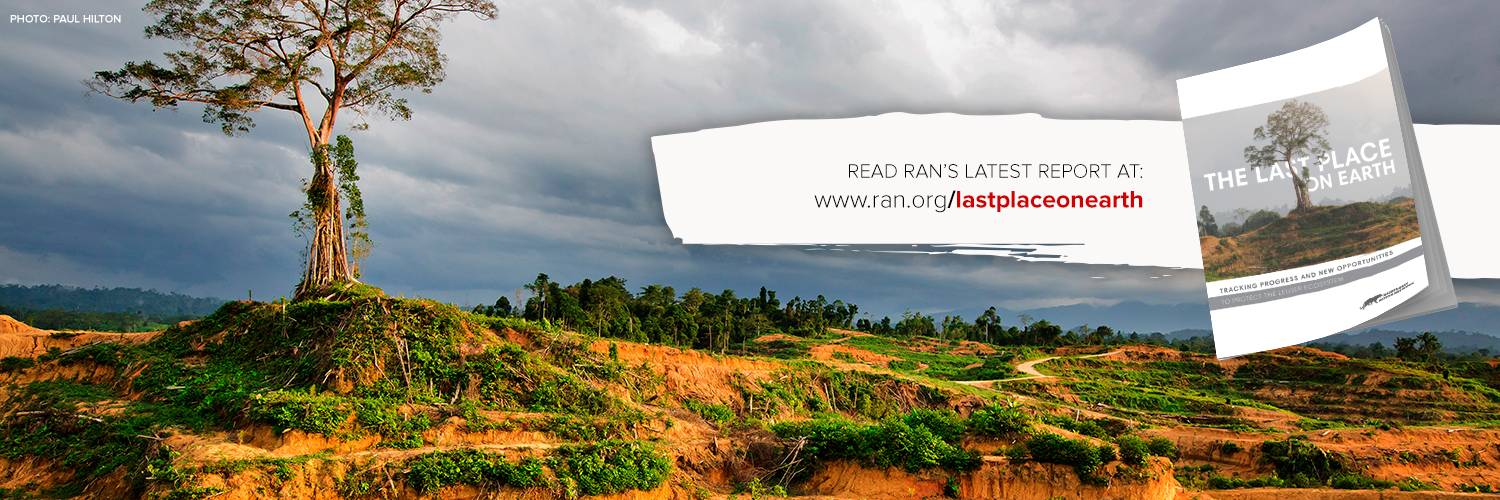Right now, bulldozers are destroying the heart of the rainforests and peatlands of the Leuser Ecosystem for Conflict Palm Oil.
At 6.5 million acres, Indonesia’s Leuser Ecosystem is like nowhere else. Its lowland rainforests are the last place on Earth that can support, together in the wild, viable populations of rare species like Sumatran tigers, orangutans, rhinos, elephants and sun bears. If protected, its nearly half million acres of carbon-rich peatlands could help secure a stable climate. Otherwise, the draining and deforestation of these peatlands, and forest fires that may be intentionally set to cheaply clear the land, result in massive greenhouse gas emissions—fires like these are the primary cause of the current Indonesian haze disaster.
 Newborn Sumatran elephant at the Conservation Response Unit in Tangkahan, Leuser Ecosystem, August 2015.
Newborn Sumatran elephant at the Conservation Response Unit in Tangkahan, Leuser Ecosystem, August 2015.
The Threat: Conflict Palm Oil
Driving this destruction is the skyrocketing global demand for palm oil. Found in over half of all packaged goods in an avergae local supermarket, the blind growth in demand for palm oil has recklessly pushed massive, industrial-scale plantations deeper and deeper into the heart of Indonesia’s rainforests, including the vital Leuser Ecosystem.
Today, RAN released a new report exposing the ‘Conflict Palm Oil Culprits’ responsible for the ongoing destruction of the lowland rainforests and peatlands of the Leuser Ecosystem. Right now, nine Conflict Palm Oil Culprits threaten the lowland rainforests that are the world’s best remaining habitat for the critically endangered Sumatran elephant. Other companies are destroying the carbon-rich peatlands, including the Indonesian government’s own PTPN III, which is draining and destroying the Leuser Ecosystem’s largest, deepest, and most intact peatland. This destruction and climate disaster must be stopped.

Forest clearance by palm oil company PT. Tualang Raya within the Leuser Ecosystem, August 2015. Forest clearance was also confirmed as recently as September 2015.
From the scale of ongoing destruction in these critical areas, it is clear that if more collective action is not taken now, we risk losing the Leuser Ecosystem forever.
New Opportunities
A year ago RAN exposed the threats to this global biodiversity hotspot in an effort to stop the destruction of the Leuser Ecosystem and secure its permanent protection. As a result, the ‘Big Three Buyers’ of palm oil from the region—Wilmar International, Musim Mas Group and Golden Agri-Resources—have prioritized taking action to protect the Leuser Ecosystem. Despite these efforts, the Big Three Buyers so far have failed to halt the bulldozers.
There is hope that the Big Three Buyers can use their buying power to drive real change on the ground in the Leuser Ecosystem. Together, these traders have significant influence as they buy, refine, and export a significant proportion of palm oil produced by growers operating in the Indonesian provinces of Aceh and North Sumatra. These traders must take real and immediate action to achieve a moratorium on the destruction of rainforests and peatlands and to secure ongoing legal protection for the Leuser Ecosystem.
 A Wallace’s flying frog (Rhacophorus nigropalmatus) pictured in the Leuser Ecosystem, August 2015.
A Wallace’s flying frog (Rhacophorus nigropalmatus) pictured in the Leuser Ecosystem, August 2015.
The Big Three Buyers must drive the transformation of the palm oil sector in Aceh by providing incentives for their suppliers to comply with a higher standard for responsible palm oil production and to cut ties with any bad actors that fail to halt the destruction of rainforests and peatlands or continue to violate the rights of local communities and workers. Along with protecting and restoring critical rainforest and peatlands, these major palm oil traders must ensure all their suppliers fully respect the right of communities to give or withhold their Free, Prior and Informed Consent for palm oil development on lands where they hold customary, legal, or user rights. Each company must also invest in long-term, meaningful programs to support smallholders in achieving compliance with their policies as well as work with communities to create alternative economic development pathways outside the unsustainable plantation model.
Left unchecked, palm oil expansion will lead to the loss of the Leuser Ecosystem’s lowland forests and its carbon-rich peatlands that need to be protected to secure a stable global climate. If a new pathway for development in Aceh is not created that has the protection of the Leuser Ecosystem at its core, millions of Achenese people will continue to see their land stolen, forests degraded, their water sources and air polluted, and their sources of livelihood destroyed.
 New palm oil plantation. PT. Tualang Raya, within the Leuser Ecosystem, August 2015.
New palm oil plantation. PT. Tualang Raya, within the Leuser Ecosystem, August 2015.
To make matters worse, a plan for greater development of the Leuser Ecosystem is currently being deliberated by the government of Aceh and the central government of Indonesia. If Aceh’s new spatial plan is implemented, it will remove protections from the Leuser Ecosystem and open up more critical lowland rainforest and peatlands to large-scale industrial development including more palm oil and pulp plantations, logging, mining and all the roads and other infrastructure that come with them. If this misguided land clearance plan is implemented by the government of Aceh it will be a disaster for the climate, forests, local people and the long term economic health and sustainability of the region.
The threats to the Leuser Ecosystem, and the local communities that rely on it, are real and ongoing. It is clear that the time to take action to protect the Leuser Ecosystem is now. We all have a role to play. We all have something to lose.
